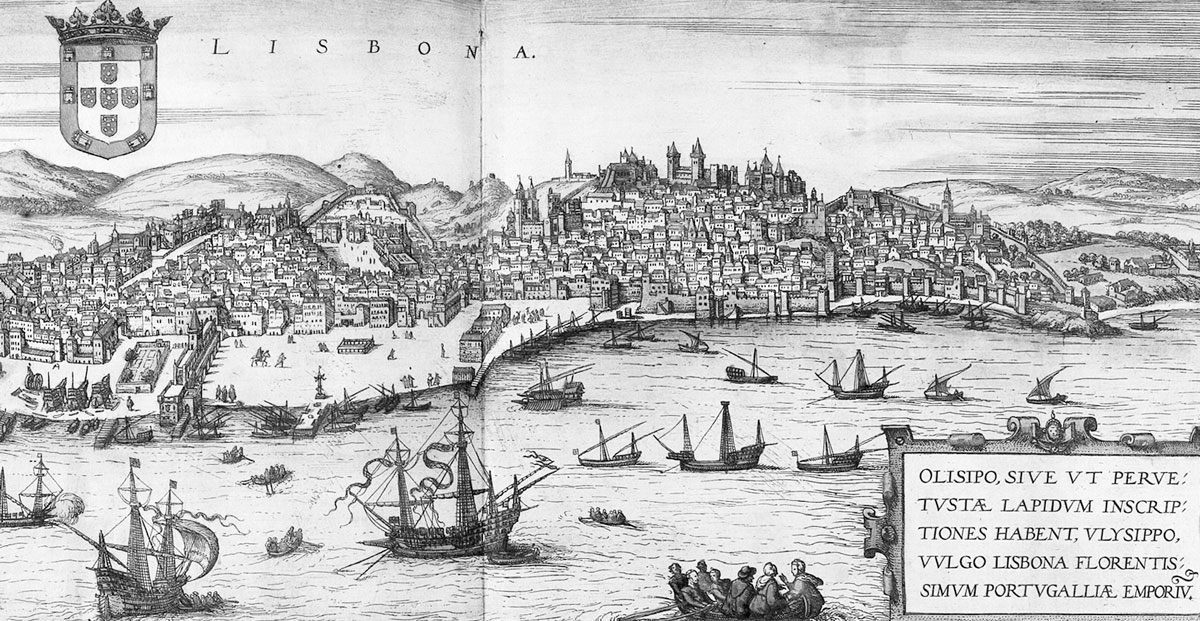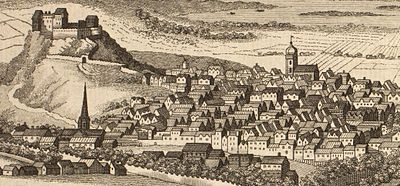Two bridges between Lisbon and Edinburgh

| Laurinda Linda & Our Goodman (Sete noites de bebedeira) | Laurinda Linda & Our Goodman (Seven Drunken Nights) |
| A balada portuguesa Laurinda (1) e a balada escocesa Our Goodman (2) pertencem a um grupo de baladas existentes em muitos países europeus que estão sem dúvida geneticamente relacionadas. A base de todas elas é o tema da mulher adúltera e esperta, surpreendida quase em flagrante pelo marido quando este volta de viagem. Este tema é desenvolvido através duma série de perguntas do marido sobre peças de roupa ou outros objectos que ele inesperadamente encontra ao regressar a casa e através duma série de respostas imaginativas da mulher, tentando escapar a ser desmascarada. Embora contem a mesma história, estas baladas apresentam diferenças próprias dos textos da tradição oral. A balada escocesa aborda o tema do adultério de modo meio cómico, fazendo com que o marido regresse a casa bêbado e dando à história um final aberto, que poderá ser visto como um final feliz ou, pelo menos, sem conflito. Por seu lado, a balada portuguesa leva o tema muito a sério, terminando a história com a decisão do marido de se separar da adúltera. Nalgumas versões da balada portuguesa, o marido diz mesmo que irá devolver a adúltera ao pai dela, "para que ele veja a mulher que me entregou". Repare-se, de qualquer modo, como estas baladas mostram um entendimento igual da questão do adultério: o problema está no adultério da mulher, pois é a mulher que a sociedade vê como devendo ser fiel. Pelo contrário, nos textos orais não costuma aparecer (ou aparece muito, muito raramente) a questão da fidelidade do marido, parecendo encarar-se o adultério masculino como algo desculpável e, até, natural. | Portuguese ballad Laurinda (1) and Scottish ballad Our Goodman (2) are part of a group of ballads that appear in several European countries, and which are indeed genetically related. They´re structured upon the same theme of the adulterous and clever woman almost flagrantly surprised by her husband when he returns on from a journey. The theme unfolds through a sequence of questions put by the husband about unexpected garments or other objects he finds when returning home, and through a series of inventive answers by the wife in hope she won't be caught. Although the story is the same, these ballads show specific differences that are natural to oral tradition texts. The Scottish ballad displays the theme in a slightly comical manner, having the husband return home drunk and leaving the story to an open ending, which will be, if not happy, at least peaceful. On the other hand, the Portuguese ballad takes the theme to heart, ending the story with the husband making a decision to leave the adulterer. In some versions of the Portuguese ballad, the husband even says he will send the adulterer back to her father "so that he sees the wife he gave me". Nevertheless, it's worth noting how these ballads display an equal understanding of the adultery issue: the problem lies in female adultery, as society perceives faithfulness as a women's obligation. On the contrary, we find little (or very seldom) the theme of husband faithfulness in oral texts, which may indicate that male adultery is seen as a somewhat forgivable or even natural event. |
| José Joaquim Dias Marques (Universidade do Algarve) | |
|
(1) Balada (ou mais propriamente "romance", termo usado para designar as baladas portuguesas) nº M1 do catálogo de Manuel da Costa Fontes, O Romanceiro Português e Brasileiro: Índice temático e bibliográfico. (2) Balada nº274 da colecção de Francis J. Child, Popular English and Scottish Ballads. A versão (recolhida na Escócia em 1776) que será apresentada no espectáculo é a nº274A da colecção de Child. Foi por ele transcrita dos manuscritos de David Herd que estão na base da sua obra Ancient and Modern Scottish Songs (1776). Esta balada é também conhecida como Seven Drunken Nights (versão popularizada por The Dubliners). |
(1) Ballad (or rather "romance", term used to designate the Portuguese ballads) nº M1 from Manuel Costa Fontes's catalogue, O Romanceiro Português e Brasileiro: Índice temático e bibliográfico. (2) Ballad 274 from Francis J. Child's collection English and Scottish Popular Ballads. The version collected in Scotland (1776) that will be presented at the festival is the 274A from Child's collection. It was transcribed by Child from the manuscripts of David Herd of his collection Ancient and Modern Scottish Songs. This ballad is also known as Seven Drunken Nights (made popular by The Dubliners). |
|
|
|
| Laurinda Linda
-Ó Laurinda, linda, linda! -Sim, sim, cavalheiro, sim! Onze horas, meia-noite Ou ela está doentinha -De quem é este chapéu -De quem é este casaco -De quem é este cavalo -De quem é este suspiro -Ó Laurinha, linda, linda -Vai buscar as tuas irmãs! |
Fair Laurinda
-Oh Laurinda, fair Laurinda ! -Aye! Oh aye, sweet gentle man! 'Round eleven, close to twelve Perhaps Laurinda has taken ill -Who owns that hat behind the door? -Who owns that coat upon the chair? -Who owns that horse outside the door? -Who owns that sigh inside my bed? -Oh Laurinda , fair Laurinda -Bring your sisters to my presence!
|
|
English version: Ana Sofia Paiva
|
|
|
|
|
| Sete Noites de Bebedeira
Segunda-feira cheguei a casa -Ó meu grande borrachão! Terça-feira cheguei a casa Ó meu grande borrachão! Quarta-feira cheguei a casa -Ó meu grande borrachão! Quinta-feira cheguei a casa -Ó meu grande borrachão! Sexta-feira cheguei a casa -Ó meu grande borrachão |
Seven Drunken Nights
As I went home on a Monday night -Ah, you´re drunk you´re drunk! As I went home on a Tuesday night As I went home on a Tuesday night As I went home on a Wednesday night -Ah, you´re drunk you´re drunk! As I went home on a Thursday night -Ah, you´re drunk you´re drunk! As I went home on a Friday night -Ah, you´re drunk you´re drunk! |
| Versão portuguesa: Ana Sofia Paiva | |


